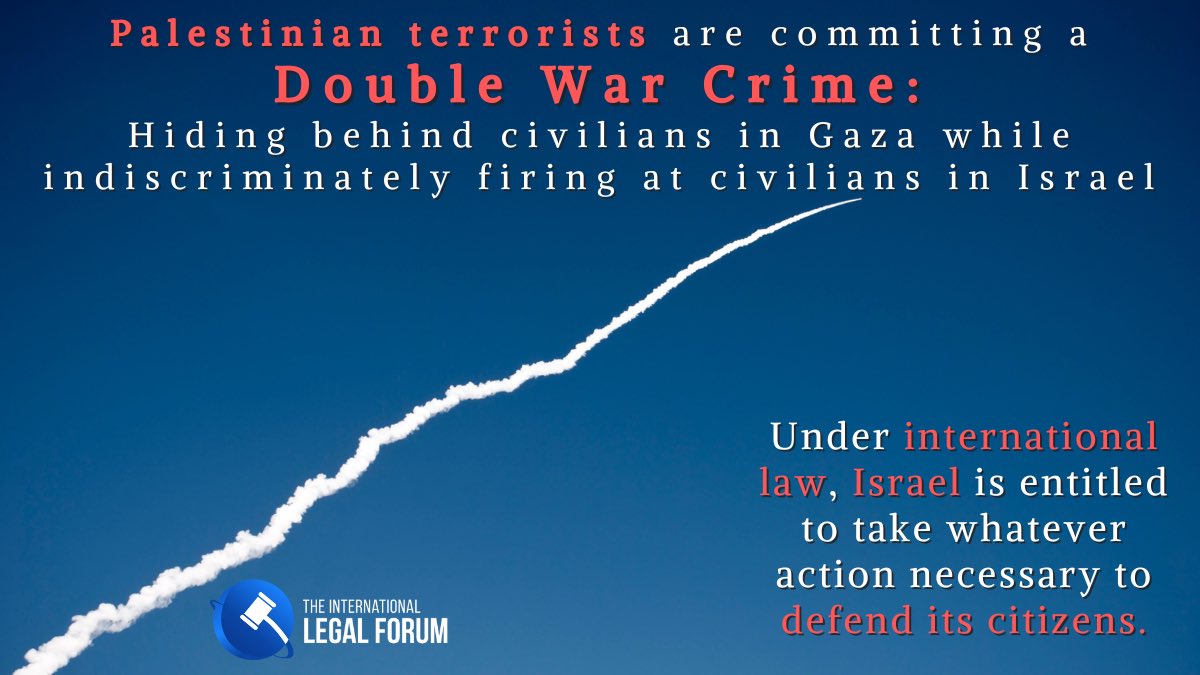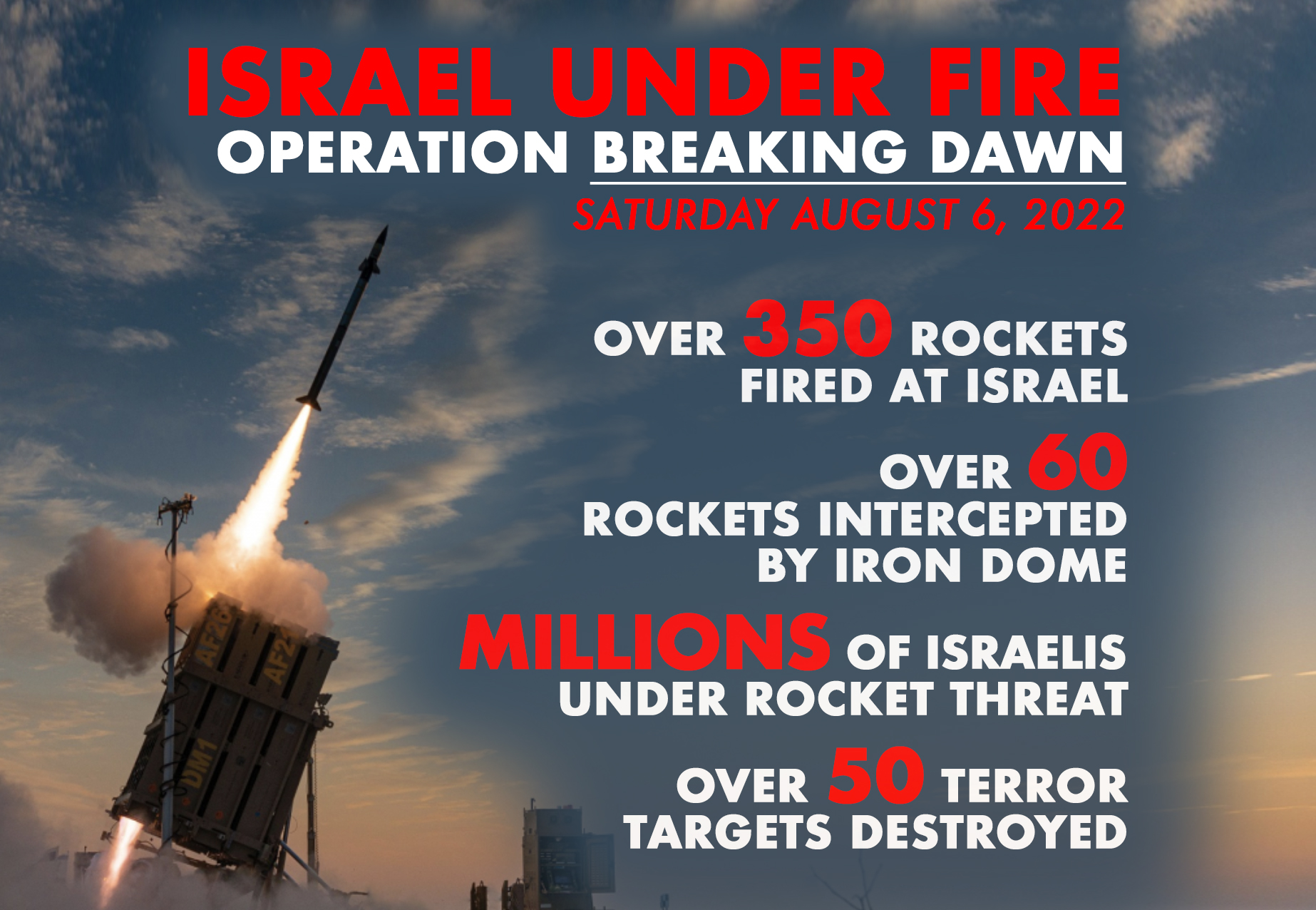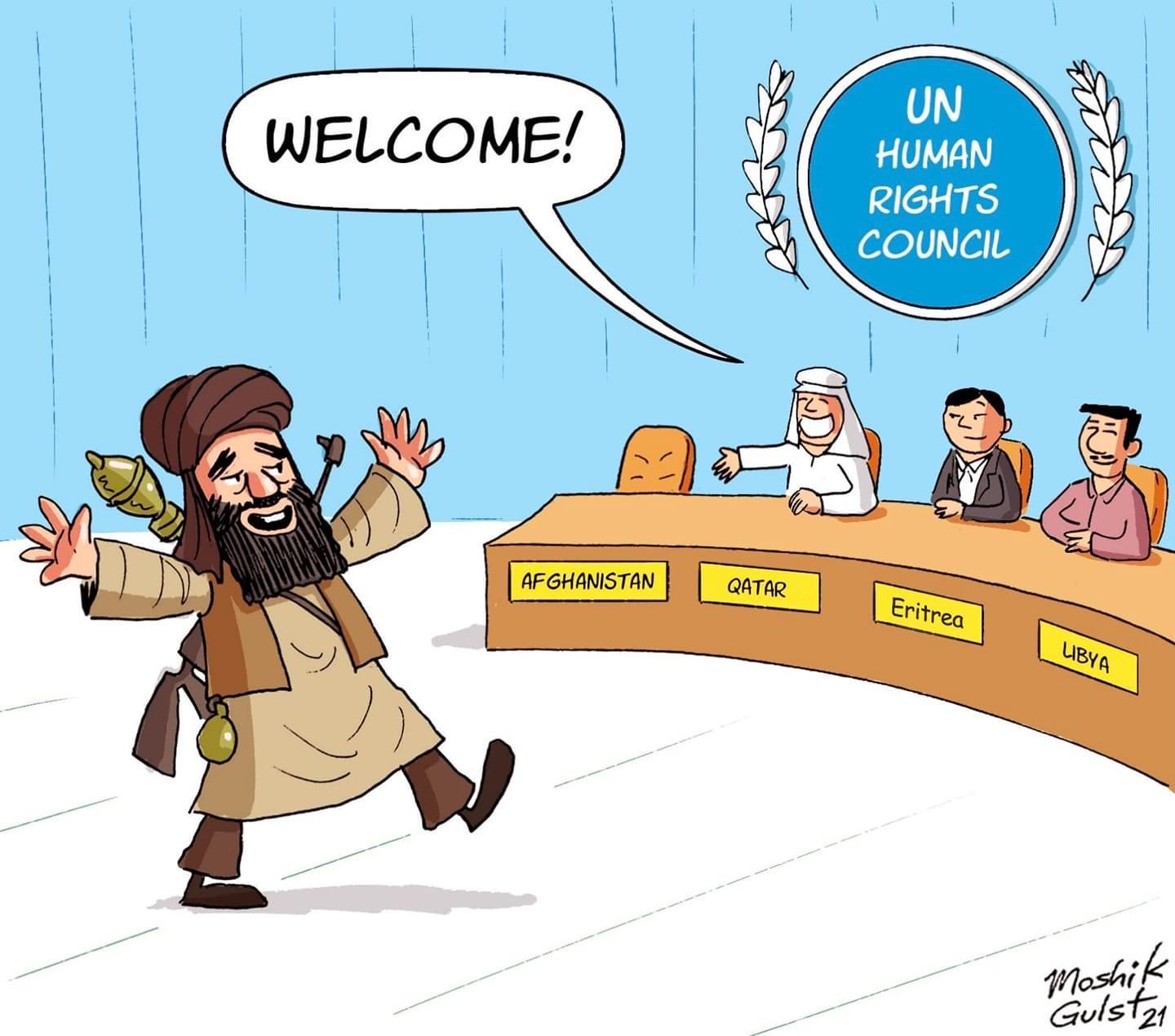JPost Editorial: Operation Breaking Dawn was a long time in the making
Operation Breaking Dawn, which started on Friday, was a long time in the making.Richard Kemp: Gaza: The Usual Suspects Condemn Israel
Israel’s southern communities had been in a lockdown since last Tuesday after Israeli security forces arrested Palestinian Islamic Jihad senior member Bassam al-Saadi in Jenin. Good intelligence and careful preparation are obviously necessary to carry out such an arrest.
Residents of the South, who were held virtual hostages afterwards, now know why: Such intelligence and preparation also enabled the IDF on Friday to kill Islamic Jihad’s top commander in Gaza, Tayseer al-Jabari, in a precise operation and thwart a ticking time bomb: He was reportedly involved in planning imminent major attacks on Israel, including the use of lethal anti-tank missiles close to the border.
Jabari replaced Baha Abu Al-Ata, who was killed in a similar airstrike in November 2019. Other senior Islamic Jihad figures were killed in well-conducted strikes over the weekend, including Islamic Jihad’s southern division commander Khaled Mansour.
Although it is natural to compare the current round of fighting with terrorists in the Gaza Strip to last year’s Operation Guardian of the Walls – when Hamas launched an attack on Israel starting in the capital on Jerusalem Day in May 2021 – Operation Breaking Dawn so far seems to have more in common with Operation Black Belt in which Al-Ata was killed and Hamas chose not to get openly involved.
Responding to threats
But if Israel doesn’t forcibly respond to the threats of one terrorist organization, the other organizations driven by the same desire to harm the Jewish state will be emboldened. And that includes Hezbollah over Israel’s northern border with Lebanon as well as terror cells in Judea and Samaria (the West Bank).
Over the weekend, Islamic Jihad launched more than 350 rockets at Israel and many more were fired at the country yesterday. Although the United States and others issued initial statements of Israel’s right to self-defense, there were also immediate calls for Israel to prevent an escalation and in effect to stop responding.
Although Israel has the upper hand from a purely defensive viewpoint in this round of hostilities, like in previous ones, the Palestinians have the advantage when it comes to public relations and international sympathy. Whenever Israel justifiably responds to the indiscriminate firing of rockets – every one of them a war crime – by carrying out attacks against terrorist targets in Gaza, it is immediately and unfairly perceived as the aggressor rather than the victim.
Commenting on the killing of Zawahiri, UN Secretary General's spokesman Stephane Dujarric said the UN was "committed to fighting against terrorism and strengthening international cooperation in countering that threat".The Collapse of Islamic Jihad's Equations
Of course it was a different story when Israel acted against Jabari. UN Special Coordinator for the Middle East Peace Process Tor Wennesland was "deeply concerned" by "the targeted killing today of a Palestinian Islamic Jihad leader inside Gaza."
Israel has not claimed its operation in Gaza — codenamed Breaking Dawn — is to deter. The government has made it clear that the strikes were to prevent an imminent threat to the Israeli population. It had hard intelligence that PIJ, led by Jabari, was planning attacks across the border from Gaza. Protecting its people from violent external attack is not only permitted under international law, it is the duty of every government. If deterrence of such attacks were possible, Israel would have taken action to deter.
PIJ is an Iranian proxy, directed and funded to the tune of hundreds of millions of dollars by Iran's Islamic Revolutionary Guard Corps (IRGC). Its leader, Ziad Nakhaleh, has been in Tehran for the last few days, meeting with his IRGC paymasters and other government officials including Iranian President Ebrahim Raisi.
As PIJ and its fellow jihadists have indiscriminately fired an estimated 400 missiles (at time of writing) at targets from Sderot to Tel Aviv since Operation Breaking Dawn began, the IDF has continued to launch precision strikes from the air and the ground to halt the attacks on Israeli citizens. Just as Israel's casus belli for attacking PIJ targets was lawful, it has taken the utmost care to ensure its continued strikes are also lawful, only attacking targets that are proportionate and necessary to the military objectives and giving warnings where civilian casualties could occur.
We can expect non-governmental organisations (NGOs) such as Human Rights Watch to pile on. Amnesty International, however, might be slightly more circumspect as they are at present gyrating from the widespread international reproach that greeted their just-published report condemning Ukraine's defensive actions, in which they again showed the total incomprehension of war and the laws of war that they often demonstrate in their denunciations of Israel.
Slavering for the last two days at the prospect of IDF-inflicted mass casualties, much of the media immediately and without any evidence eagerly pointed the finger at Israel over the tragic killing of seven people, including four children, in Jabalia camp in the Gaza Strip. They will undoubtedly try, but journalists and UN investigators will find it hard to refute the IDF's confirmation that they did not strike the location and have conclusive video and radar evidence that the deaths were caused by a misfired PIJ rocket, launched as so often from within the civilian population. This would certainly fit, as approximately a quarter of all terrorist rockets fired so far during this campaign have landed inside Gaza, not in Israel.
Islamic Jihad leader Ziyad al-Nakhalah said during a television interview in Tehran that almost any time Israel attacks Gaza, all of the terrorist organizations rally to respond in unison. Yet Hamas has not fired a single rocket.Ruthie Blum: Avoiding mention of Iran while urging Israeli restraint
One Islamic Jihad spokesman told Lebanon's Al-Mayadeen network on Saturday that the commander of Islamic Jihad's northern region in Gaza wasn't killed due to superb intelligence acquired by Israel, but rather because he was intentionally deceived into going there by the Egyptian mediator in order "to finalize a cease-fire agreement with Israel" - implying "treasonous collaboration" between Cairo and Jerusalem.
Another spokesman said Hamas was completely in step with Islamic Jihad and a full partner in the rocket attacks against Israel, but that it was concealing this - reflecting Islamic Jihad's distress over being alone in this fight.
It's safe to assume that Hamas may see the "positive" aspects of the Israeli offensive: putting Islamic Jihad in its place, sending it a message that it isn't allowed to plot attacks against Israel without Hamas' approval, and making it obey the decisions that are made in Gaza, not in Tehran.
Meanwhile, Israel made it clear to the PIJ that it was willing to end the fighting, but only if the calm is reciprocated. PIJ has said through mediators that one condition for its compliance is the release of Sa’adi—a demand that should not and will not be met.
None of this makes the slightest difference to the moral-equivalence choir, certainly not those at the United Nations, whose Israel-bashing knows no bounds. Indeed, contrary to Erdan’s false hopes, they are at the ready to sing their tired chorus of bogus accusations, regardless of other occurrences around the globe.
That Russia burst into its own aria is not surprising, of course, since anything that serves as a distraction from its blitzing of Ukraine is welcome in Moscow.
In a statement on Saturday, Russian Foreign Ministry spokeswoman Maria Zakharova had an interesting slant on the events that are causing the Kremlin such “profound worry”: “The new escalation was caused by the Israeli army firing into the Gaza Strip on August 5, to which Palestinian groups responded by carrying out massive and indiscriminate bombardments on Israeli territory.”
Adding that her government was calling called on “all parties to show maximum restraint and work towards a ceasefire,” she said that Moscow reaffirms its “principled and consistent position, reflected in the relevant resolutions of the U.N. General Assembly and Security Council in support of a comprehensive and long-term settlement of the Palestinian-Israeli conflict in accordance with the two-state principle.”
Finally, she concluded, “It is possible to put an end to cyclical violence only within the framework of the negotiation process, the result of which should be the realization of the legitimate national rights of the Palestinian people to establish an independent state within the 1967 borders.”
She conveniently omitted key facts, such as Tehran’s role as sole bankroller of its proxy, PIJ. Hamas also receives money from Iran, but has other sources of income, as well.
Speaking of Iran, nuclear talks resumed in Vienna on Thursday between the Islamic Republic and the world powers hungry to return to the Joint Comprehensive Plan of Action (JCPOA)—the disastrous 2015 nuclear deal that the mullah-led regime never adhered to in any case, and from which former U.S. President Donald Trump withdrew in 2018.
As Trump’s predecessor, Barack Obama, orchestrated the JCPOA, and his successor, Joe Biden, is as desperate to salvage it as Russian President Vladimir Putin, it is beneficial for them to leave Iran out of any discussion on Gaza. U.S. Ambassador to Israel Tom Nides, while giving a social-media nod to Israel’s “right to protect itself,” added to his tweet, “We are engaging with different parties and urge all sides for calm.”
Iran couldn’t be more pleased.
















 Jericho, August 4 - A high-ranking functionary of Mahmoud Abbas's government blamed Israel for exacerbating the shortage of natural and agricultural resources, observing that to keep his spa, garden, and swimming facilities functioning, he has no choice but to deplete those public resources, all thanks to Israeli policies that fail to maintain sufficient supply for both his needs and those who must drink, bathe, wash, and cook.
Jericho, August 4 - A high-ranking functionary of Mahmoud Abbas's government blamed Israel for exacerbating the shortage of natural and agricultural resources, observing that to keep his spa, garden, and swimming facilities functioning, he has no choice but to deplete those public resources, all thanks to Israeli policies that fail to maintain sufficient supply for both his needs and those who must drink, bathe, wash, and cook.






















